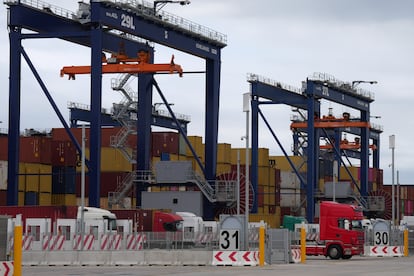Trump's policies: from disbelief to denial

Text in which the author advocates ideas and draws conclusions based on his or her interpretation of facts and data

After the initial stupor caused by the US trade offensive , the global economy has entered a strange period of decoupling between the perception of uncertainty and data that reveal a certain resilience. In Spain, too, the persistently healthy economic momentum contrasts with the succession of external shocks and the vicissitudes of national politics. This sense of immunity, however, cannot last indefinitely.
For now, the markets are optimistic, given that stock markets have completely erased their losses following "Liberation Day." The Nasdaq has risen almost 7% so far this year, the Euro Stoxx 50 has risen 12%, and the Ibex 35 has risen a staggering 22%. In other words, savers are incredulous at the incendiary (and reversible) statements of President Donald Trump, considering that the US economy can withstand both a 10% tariff and a 25% increase in public debt, which is what is anticipated following the approval of the Republican administration's "beautiful" tax reform . Markets are also betting on interest rate cuts, especially when there is a change at the head of the Federal Reserve. And they are also betting on a manageable impact of the trade war on this side of the Atlantic.
This perception is also supported by the most recent macroeconomic data, which are consistent with a 0.6% GDP growth in the US in the second quarter, according to the GDPnow indicator, and in the eurozone, according to the PMI indicator, as well as in Spain (0.5%, according to Funcas).
Given these encouraging signs, it's worth noting two factors of vulnerability. First, the impact of tariffs on international trade is imminent: stockpiling by companies, or early shipments to the US, have mitigated the impact of trade restrictions. But these practices only provide temporary remedies: over time, trade will inevitably suffer from the trade war, even in the favorable scenario of a general surcharge of no more than 10% on European products, and somewhat higher in the case of automobiles, steel, aluminum, and some agricultural products.
Second, markets do not seem to have absorbed the inherent inconsistency of US economic policy. On the one hand, tariffs generate distrust among investors, as protectionism raises production costs, disrupts supply chains, and ultimately erodes productive potential. On the other hand, the US needs these same investors to finance an already rampant public deficit that will worsen with tax cuts. In other words, Trump's economic policy generates further imbalances while undermining investors' incentives to continue financing them.
The appreciation of the euro, a currency that has begun to act as a safe haven, could be a collateral victim of this contradiction. While the single currency has already appreciated, the adjustment could be greater as protectionist threats materialize. As many other currencies, including the yuan itself, tend to move in step with the dollar, the euro's appreciation will have a global impact and could be a much more costly factor for exporters than the tariffs themselves.
Fortunately, the Spanish economy is relatively unaffected by both the escalation of tariffs and the consequences of the euro's appreciation against other currencies. This is because our trade flows primarily to the eurozone, with which we maintain a solid surplus. Given what is initially a favorable situation, however, the obstacle stems from the limited room for maneuver in our economic policy, with budgets prorogued indefinitely and a limited capacity to reach consensus on significant reforms or measures to offset the adversities of the international situation.
The single European currency was trading around $1.17 on Friday, 13% higher than the levels seen at the beginning of the year. The euro has also tended to appreciate against other currencies, such as the Chinese yuan (10.5%), making exports less competitive. The euro's appreciation is therefore almost universal and reflects an adjustment in capital movements, particularly in relation to portfolio investment, which has accelerated following the imposition of trade restrictions by the Trump administration in early April.
EL PAÍS





